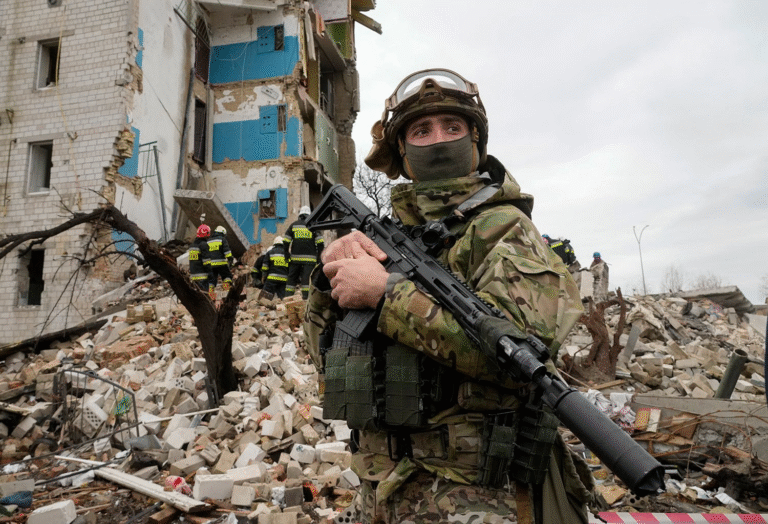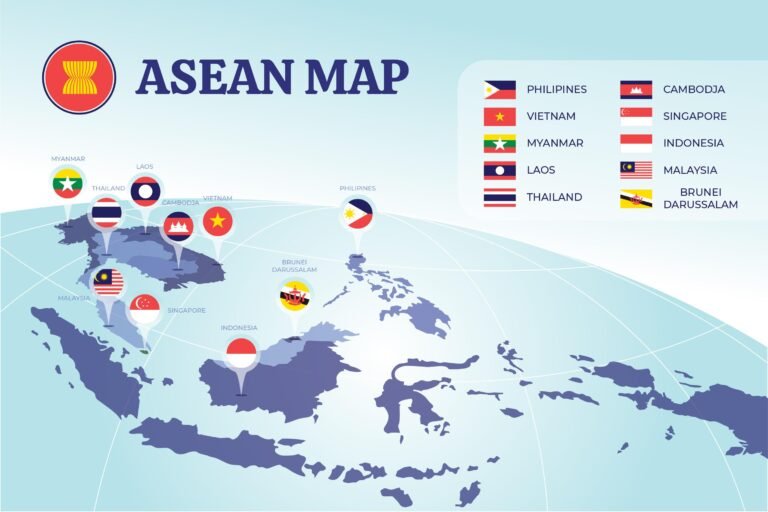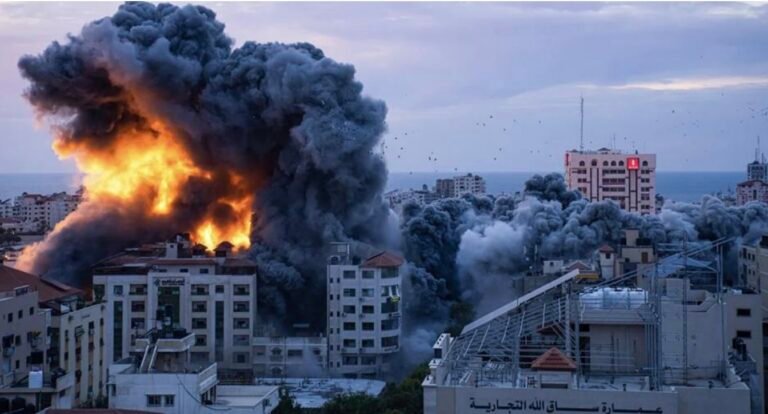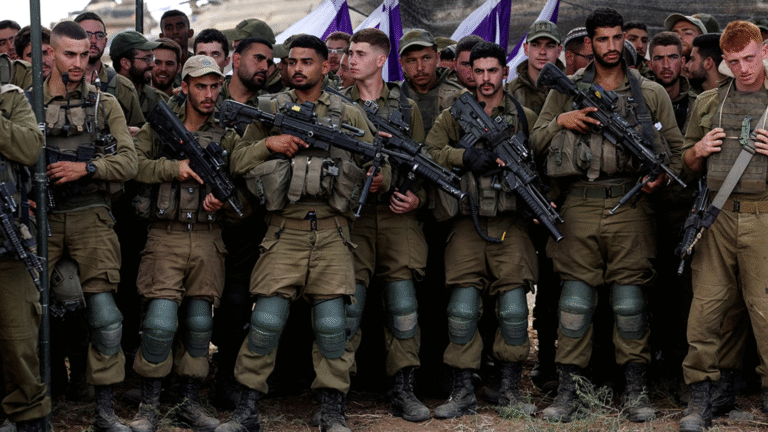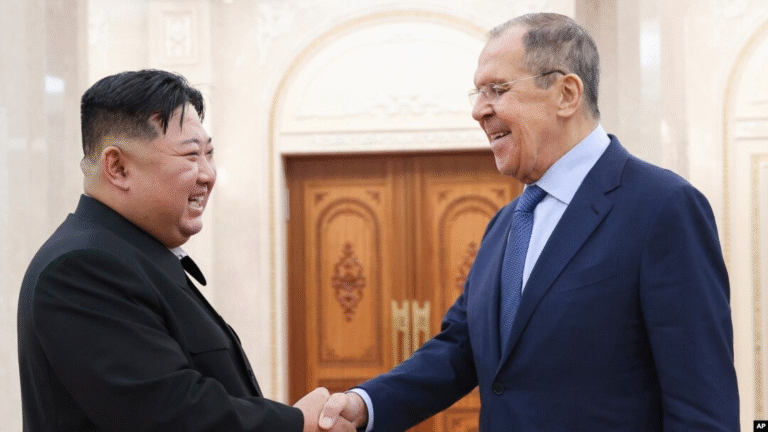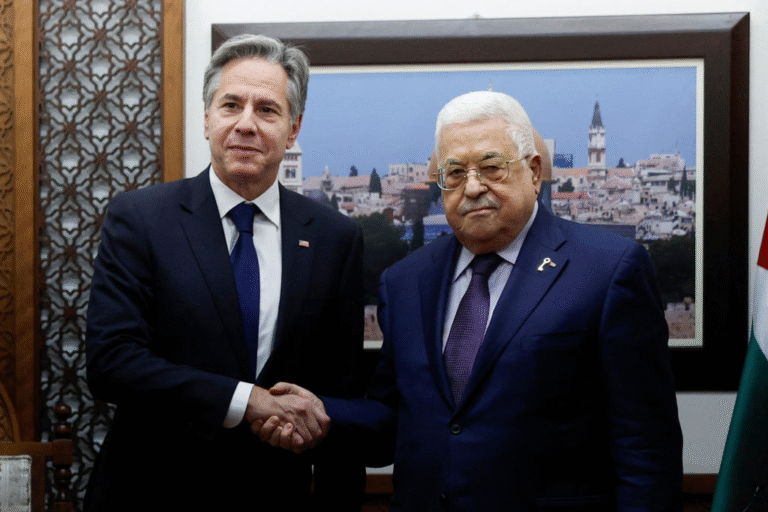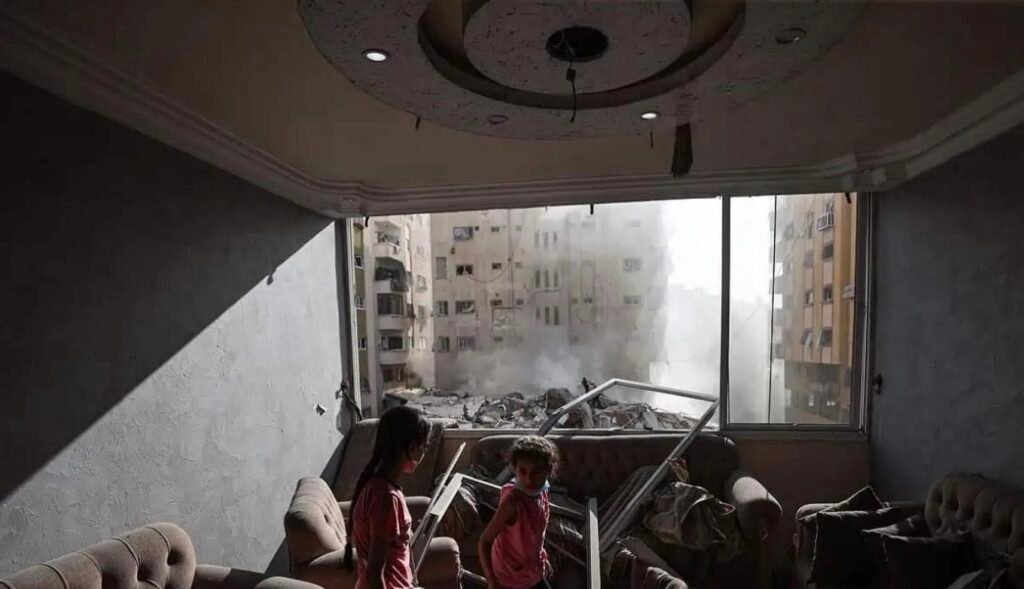
Children in their damaged apartment in Gaza following Israeli airstrikes on Saturday,
October 7, 2023, Photo: Anadolu Agency
Sophie Gilpin
The America-Eurasia Center
www.EurasiaCenter.org
Eurasia Brief
US-Middle East Program
America-Eurasia Business Coalition
www.usebc.org
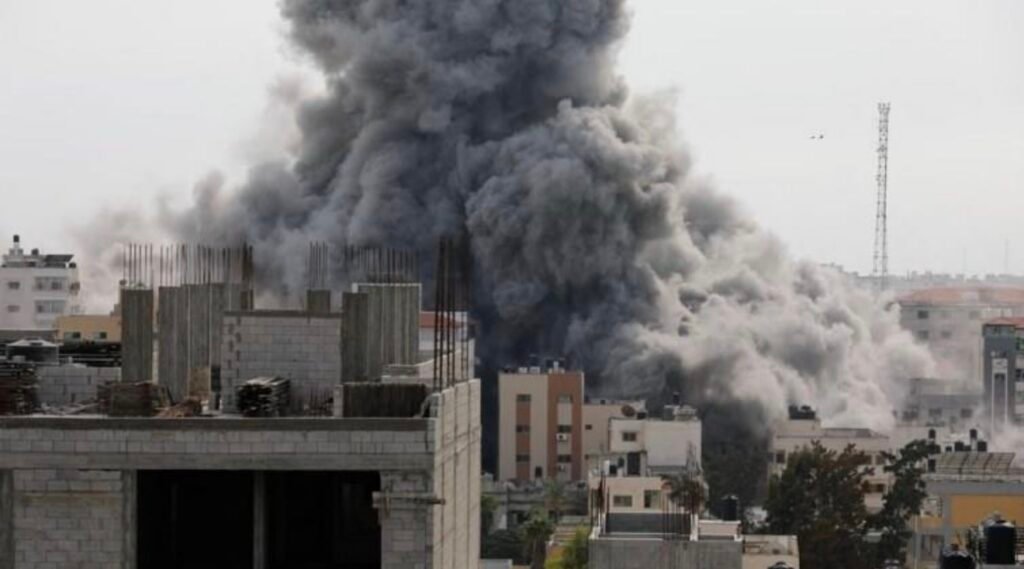
Damage from Hamas rockets in Israel, Photo Credit: Reuters.
In what is undoubtedly going to go down in history as one of the darkest days for the people
of both Israel and Palestine, Hamas has launched a full-scale war against Israel, damaging Israeli
cities with rockets, murdering civilians, taking hostages, and making threats. In retaliation for the
horrendous loss of life, Israel has fought back, sending a barrage of rockets down on Gaza, hitting
not only Hamas targets but government and university buildings, infrastructure, and a police station.1
Israel has also put into place a total blockade on all goods going in and out of Gaza, an action which
the United Nations’ Human Rights Chief condemns as illegal under international humanitarian law.2
Israel claims to have secured its border after three days of clashes but it does not seem likely that
Hamas is willing to back down anytime soon.3 What is entirely evident, as death tolls on both sides
soar is that the people who are suffering the full weight of this violence are civilians, both Palestinian
and Israeli.
In this midst of all this uncertainty and violence, the international community has responded
with shock, but has also had mixed reactions. The UN Security Council (UNSC) convened an
emergency session on October 9th but were unable to come to a consensus on a statement. The United
States has unequivocally condemned Hamas’ attacks on Israel and was urging other members of the
UNSC to do so as well. It seems there are two factions within the UNSC, which is stalling consensus.
The United States has repeatedly stated its commitment to condemning Hamas. Russia and certain
other members of the UNSC, however, seem to be pushing for a broader focus, with Russia’s UN
Ambassador Vassily Nebenzia calling for a ceasefire.4
This war comes at a time when Saudi Arabia has been discussing normalizing diplomatic
relations with Israel and there is no doubt concern on the American and Israeli side that as this unrest
continues, those negotiations might be taken off the table. The United States is consistently
reaffirming their commitment to their ally Israel and seems to be trying to contain the spread of the
unrest to other parts of the Middle East, as Hezbollah has taken part in the attacks on Israel from the
Lebanese border.5 In an interview on CBS’s program Face the Nation, Secretary of State Antony
Blinken said, “I was on the phone yesterday- with counterparts from Egypt, from Saudi Arabia, from
Jordan, from Qatar, from the United Arab Emirates, from Türkiye, Lebanon, and many European
countries as well to make sure that, first of all, people had heard very clearly what the President said
about others in other places not taking advantage of the situation, and to use the influence that they
have with different groups to make sure that they don’t do that, precisely so that we don’t have a
broadening of this conflict to other places.”6 Shortly after this interview, the United States dispatched
the USS Gerald R. Ford aircraft carrier to the Eastern Mediterranean, seemingly to indicate to any
anti-Israel elements in the region that the US will not tolerate such action.7
Through these international reactions, it seems evident that there is something of a new (and
yet familiar) world order emerging. It is nothing new to see Russia or China opposed to American
global interests, but the Middle East is at a crossroads and it seems that powers are demanding that
they choose sides. Engaged in a similar battle for power and influence, Saudi Arabia and Iran are at
odds over leadership of the region. Amid rumors of Iranian involvement, Iran has expressed its
support for Hamas but has denied allegations of direct support in the attacks.8 While perhaps Iran did
not have direct involvement with these attacks, they are certainly going to take the opportunity to use
this devastating situation to their advantage and have done so by claiming these attacks are a warning
to Arab nations seeking to normalize ties with Israel. In a call to the Syrian foreign minister on
October 9, a senior aide to Khamenei, Ali Akbar Velayati said, “those Arab countries who wish to
establish diplomatic relations with the Zionist regime must now take a lesson from what has happened
and think twice before doing so.” In an eerie end to the conversation he added, “they are pursuing
futile plans.”9

Iran’s Supreme Leader Ayatollah Khamenei meets with Hamas Leader Ismail Haniyeh, 2014, Photo Credit: AP
Saudi Arabia has called for a cessation of violence in Israel and Palestine. They are no doubt
proceeding with extreme caution, as there is no doubt that Saudi leadership recognizes that with these
new events, their normalization talks are in jeopardy. Saudi Arabia has always maintained an official
position of support for the Palestinian cause, including appointing the first Saudi Ambassador to
Palestine just last month. To maintain their legitimacy as regional and religious power, Saudi Arabia
must continue its support for Palestine. And it seems they have, although they condemn the violence
and call for restraint, the Saudi foreign ministry included in its statement an I-told-you-so to the
Western world, referencing “its repeated warnings of the dangers of the explosion of the situation as
a result of the continued occupation, the deprivation of the Palestinian people of their legitimate rights
and the repetition of the systematic provocations against its sanctities.”10 While a defense pact with
the United States and a stake in the Israeli tech industry is certainly an attractive proposition, it is
seemingly evident to Riyadh that they must remember the Palestinian cause, whether out of genuine
concern for the treatment of the Palestinian people or to maintain popular support in the Middle East.
It is likely they will maintain a cautious stance on the ongoing unrest.

Israeli forces are deployed near Sderot at the southern border, Photo: Menahem Kahana/AFP
In addition to the confused reactions and lack of consensus on the international response,
social media has been buzzing with images and words in support of or against various actors engaged
in the issue. As this is a long-lasting conflict with many emotions and opinions, it is certainly
inevitable that there will be a large public response. This is an age of technology and a world
connected by it. The brutality and evil of humanity is on full display for all to see and people are
more able than ever to post their opinions about it. Some feel hope about a future in which
Palestinians might have a voice and don’t condemn the violence as it seems as though it was the only
way in which the voices of the oppressed would be heard. Others decry the acts of terrorism being
committed against the state of Israel. This conflict lies at the intersection of religion, politics,
economics, and so much more. There are as many opinions about it as there are people on this earth.
The one thing that is true is that this is a human conflict. And whatever one’s opinion, it affects real
people who possess all the dignity and value inherent in humanity. As nations rally to defend their
allies or condemn their enemies and as people fight for themselves and their families, let us seek to
remember, as the great writer Aleksandr Solzhenitsyn once wrote, “the line separating good and evil
passes not through states, nor between classes, nor between political parties either- but right through
every human heart – and through all human hearts.”11 The greatest thing the private citizen can do in
moments like these is seek to support our fellow humans. Find ways to be responsibly informed and
to support the preservation of Palestinian and Israeli civilians, who are suffering most in this war.
Peace is not a guarantee, but it is certainly a worthy cause.
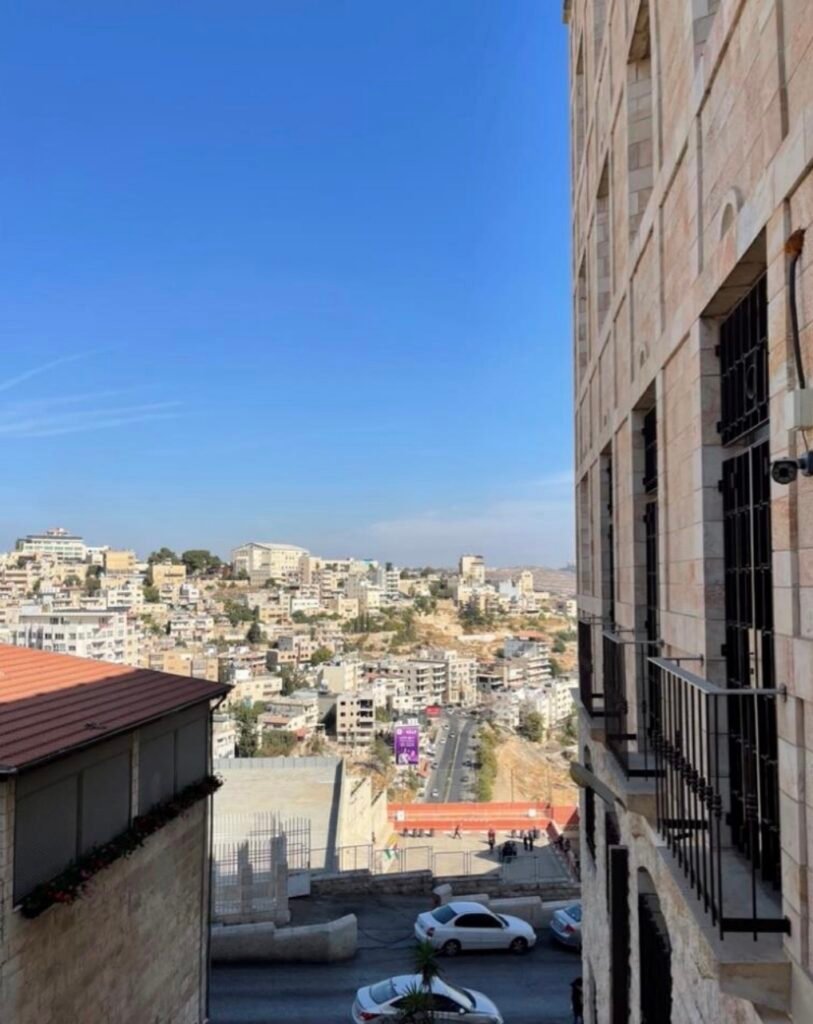
Quiet afternoon in Bethlehem, Palestine, Photo: Sophie Gilpin
- “Israel says Gaza Border Finally Secured as Air Strikes Continue,” BBC, October 10, 2023,
https://www.bbc.co.uk/news/live/world-middle-east-67050350. ↩︎ - “Israel-Hamas War Live: Appeals for ‘Safe Corridor’; Gaza Toll goes past 700,” Al-Jazeera, October 10, 2023, https://www.aljazeera.com/news/liveblog/2023/10/10/israel-hamas-war-live-appeals-for-safe-corridor-gaza-toll-goespast-700. ↩︎
- Emily Rose and Nidal Al-Mughrabi, “Israel says Gaza Border Secured after another Night of Air Strikes,” Reuters, October 10, 2023, https://www.reuters.com/world/middle-east/hamas-threatens-kill-captives-if-israel-strikes-civilians2023-10-09/. ↩︎
- “UN Security Council Meets on Gaza-Israel but Fails to Agree on Statement,” Al-Jazeera, October 9, 2023,
https://www.aljazeera.com/news/2023/10/9/un-security-council-meets-on-gaza-israel-but-fails-to-agree-on-statement. ↩︎ - Andrew Salerno-Garthwaite, “Israel Issues Warning to Lebanon and Hezbollah,” Global Data, October 10, 2023, https://www.msn.com/en-us/news/world/israel-issues-warning-to-lebanon-and-hezbollah/ar-AA1hYwqr. ↩︎
- Antony Blinken, interview by Margaret Brennan, Face the Nation, CBS, October 8, 2023, transcript. ↩︎
- Naval News Staff, “US Moves Ford Carrier Strike Group to Eastern Mediterranean,” Naval News, October 8, 2023, https://www.navalnews.com/naval-news/2023/10/us-moves-ford-carrier-strike-group-to-eastern-mediterranean/. ↩︎
- Paul Adams, “Did Iran Support Plan for Attack on Israel?” BBC, October 9, 2023, https://www.bbc.co.uk/news/worldmiddle-east-67058244. ↩︎
- James Rothwell and Ahmad Vahdat, “Attack is a Warning to Arab Nations Normalizing Ties with Israel, says Iranian Official,” The Telegraph, October 9, 2023, https://www.msn.com/en-gb/news/world/hamas-attack-a-warning-to-arabnations-normalising-ties-with-israel-says-senior-iranian/ar-AA1hVVoL. ↩︎
- Patrick Wintour, “Hamas Attack has Abruptly Altered the Picture for Middle East Diplomacy,” The Guardian, October 8, 2023, https://www.theguardian.com/world/2023/oct/08/hamas-attack-has-abruptly-altered-the-picture-formiddle-east-diplomacy. ↩︎
- Aleksandr Solzhenitsyn, The Gulag Archipelago (London: Penguin Random House, 1985). ↩︎
